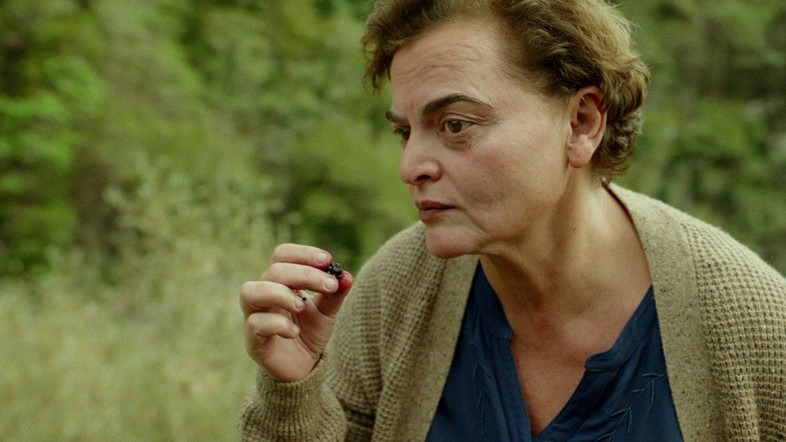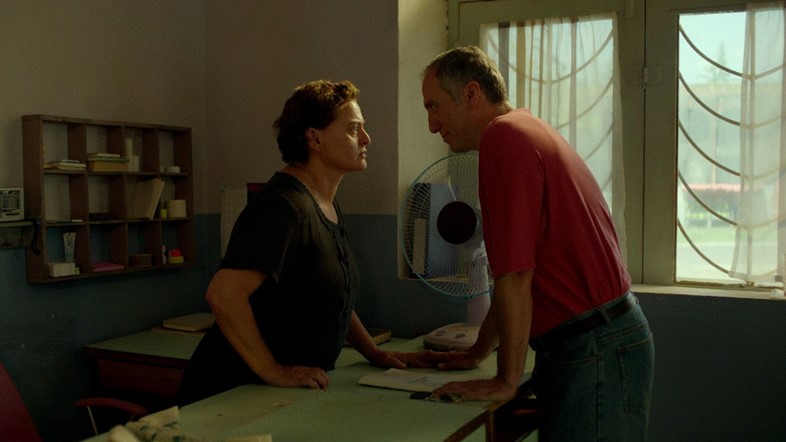As Blackbird Blackbird Blackberry is released, Georgian filmmaker Elene Naveriani talks about her unexpectedly romantic tale of one woman finding love late in life
For years, if not decades, Etero (Eka Chavleishvili) has maintained a strict daily routine in her rural Georgian village. A childless, partner-less, 48-year-old woman who lives alone, the shopkeeper regularly treks to the same café, the same shop, the same blackberry spot by a river, all under the audible scrutiny of nosy neighbours. All that changes, though, when Etero almost drowns while picking blackberries, and then, that same day, loses her virginity to a delivery man, Murman (Temiko Chichinadze). It could be that after falling down a ravine, she also considers falling in love.
Except in Blackbird Blackbird Blackberry, the smart, tender third feature from Georgian filmmaker Elene Naveriani, Etero actually strives to continue her regimented lifestyle as best she can, including singledom, and only stumbles when Murman proves to be unexpectedly romantic. “Blackberries were my parents, classmates, friends, and lovers,” Etero sternly informs her new companion, trying to explain her lifetime of solitude. “Nothing has changed since then.” Murman simply responds, “I’ll be your blackberry.” While not Shakespeare, those four words are emphatic, heartfelt, and oddly moving.
Naveriani, it turns out, remembers writing that stretch of dialogue very well. “It’s cringey,” the director tells me at Sea Containers Hotel, during the London Film Festival. “But it’s also the maximum from him. It’s him saying, ‘I’m here for you.’” The 39-year-old filmmaker behind I Am Truly a Drop of Sun on Earth and Wet Sand adapted Blackbird Blackbird Blackberry from a 2020 Georgian novel of the same name by Tamta Melashvili. “The book was controversial,” Naveriani says. “People were saying the female character was disgraceful, and ‘not a Georgian woman’. Of course, it’s a Georgian story, but you find people like her in any country.”
While her frenemies are married with children, Etero is defiantly independent, even claiming, “If marriage and dicks brought happiness, many women would be happy. But look around, who’s happy here?” According to Naveriani, who identifies as non-binary, Etero is boldly confronting societal expectations. “She’s basically a failure [to these people],” says the director. “She’s not a mum, she’s not doing the things you’re supposed to do. It’s not just that she doesn’t have sex; she is really exploding. Before encountering this guy, it’s 48 years of accumulated energy she’s keeping in. She never dared do it because of fear from the outside. If you’re not married, you can’t do this. But now it’s about daring to be who you are.”
As for the screenplay, which Naveriani wrote with Nikoloz Mdivani, the director claims “it’s not really an adaptation”. As Melashvili’s prose consists entirely of Etero’s thoughts in the first person, Naveriani and Mdivani came up with the dialogue, the visual language, and surreal sequences such as Etero witnessing her drowned corpse, in the mud, surrounded by bored well-wishers. “What I enjoy in a film is filling it with small details and gestures,” says Naveriani. “People aren’t just bodies that talk; they carry their own history.”

Naveriani notes that the film was written in her flat in Switzerland, the producer is from Switzerland, and the funding came from Switzerland: “It’s basically a Swiss film.” Based these days in Geneva, Naveriani left Georgia at 23 after feeling held back as a person and an artist. “I thought the problem was in Georgia,” the director says. “But I found that things [were the same] wherever I moved. A lot has to change. There’s still a very strong gender division in our everyday life.” While the film isn’t autobiographical, they note, “I lived by myself, but there was something bothering me … Blackbird is a story for women but not only women. It’s really about humans.”
On paper, Blackbird Blackbird Blackberry could be misconstrued as sex-negative (Etero proudly lives without it for 48 years) or conservative (fornication with a man is what existentially rewires her brain for the better). Yet the film also details the external, societal forces at play. In flashbacks, Etero suffers from the sexist prejudices of her family following her mother’s death, and in a sombre reflection reveals she was once in love with a woman – a romance thwarted by homophobia.
“It’s like we’re given a screenplay when we’re born and told to play a role,” says Naveriani. “Whether we’re male or female assigned, you do what you have to do. It’s the same with emotions and feelings. You’re supposed to love somebody who’s the opposite sex, and if you perform well, you’re a ‘fulfilled’ human being. But I really believe that if nobody tells you at the beginning of your life who to love, you totally wouldn’t be just attracted to one [type of person]. It’s going to be so much wider.”

Naveriani continues, “What I like in Etero, and what I’ve also tried to think about in my work, is that she loved someone. Of course, she heard it’s not OK – you can’t love a woman if you’re a woman. She was blocking it. Maybe she felt something, and was like, ‘No, it’s scary,’ and eliminated it right away. What’s beautiful in her is that she went through a lot of emotional states, and couldn’t feel things because of the outside world. But now she’s finding herself.”
As for wanting the film to be sex-positive, Naveriani takes a while to formulate her answer before wishing to clarify her response. “She enjoys her own solitude,” the director says. “But it doesn’t mean she doesn’t need to be loved, touched, or talked to. We’re talking about a female body that doesn’t fit into beauty standards, and has aged ‘out of date’.” The director pauses, wondering if they’re addressing my question. “It feels positive for me because it was always a part of her life. She wants to share her energy with someone else … She goes beyond this wall that she’d built for such a long time, and wants to explore and feel something.”
Blackbird Blackbird Blackberry is out in UK cinemas now.
